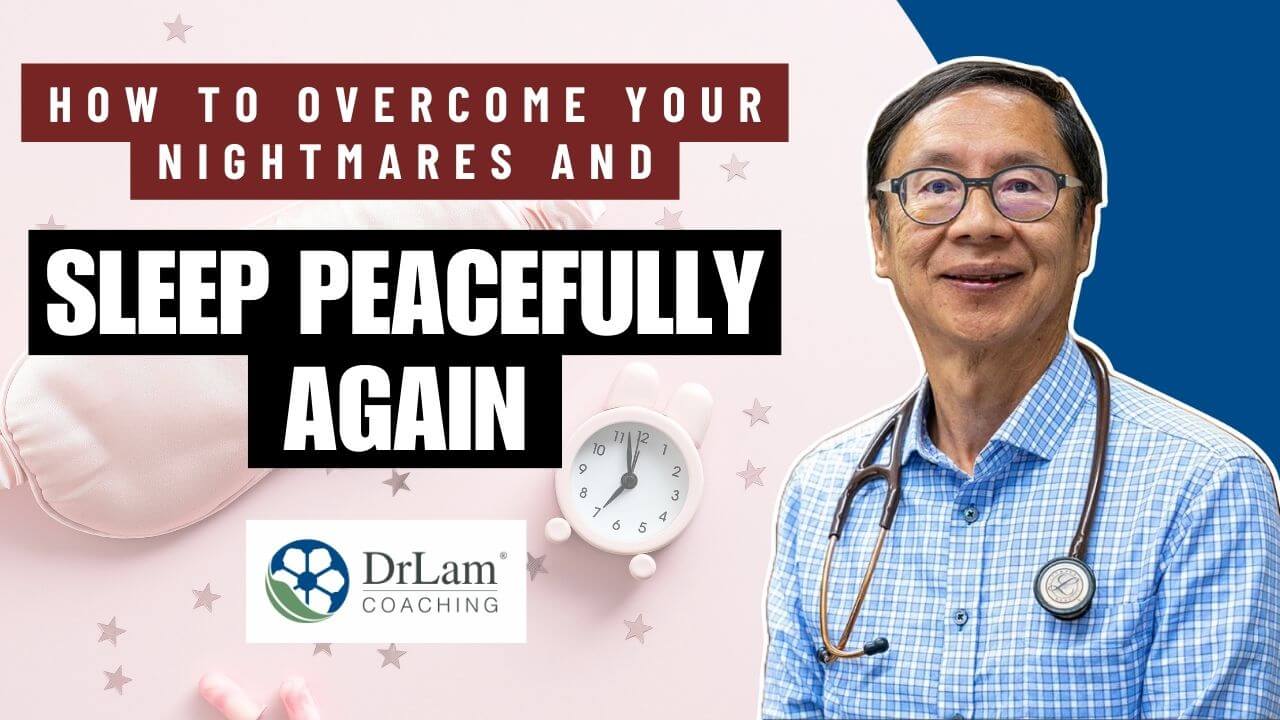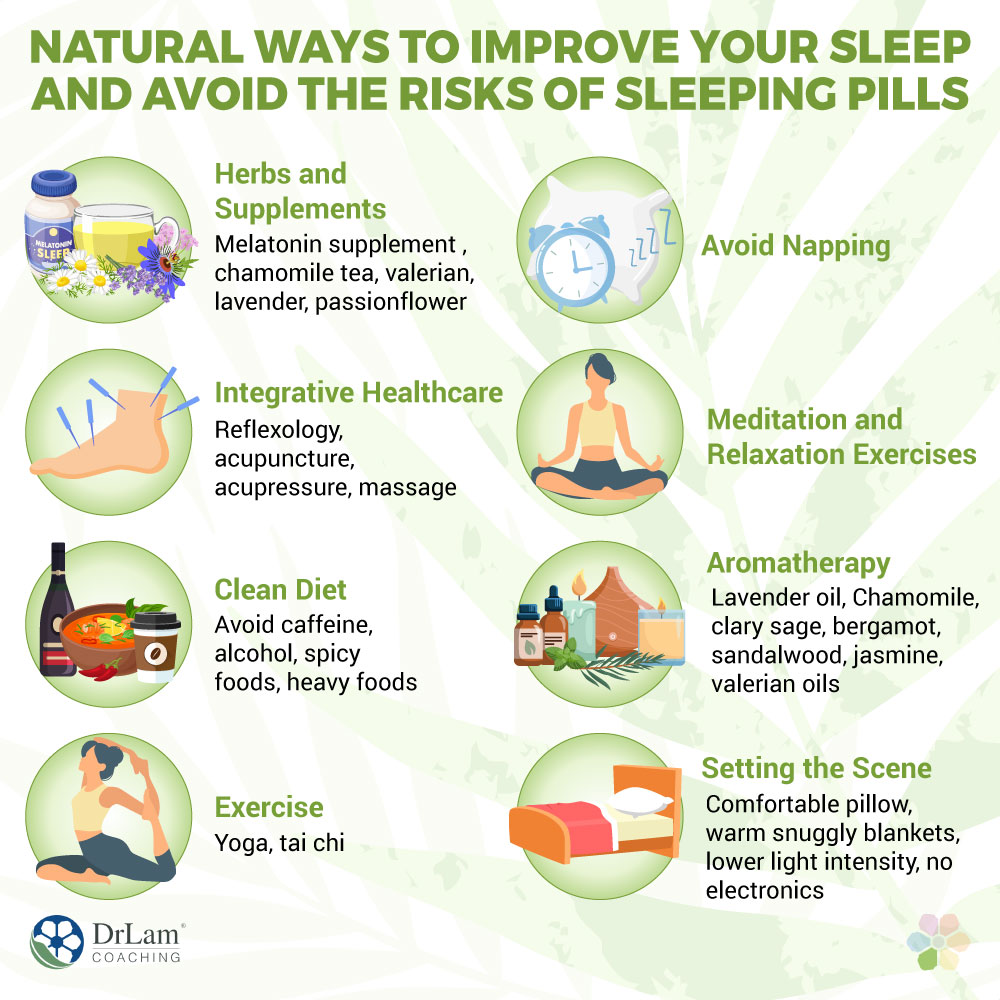
Sleep issues, whether related to falling asleep or staying asleep, have become increasingly common. The causes of these issues may vary. They could result from stress due to your job, pain from an injury, or result from taking medications. But whatever the cause, the result is lack of sleep and the various symptoms that go with it. For many, a sleeping pill is an answer. But few people realize the risks of sleeping pills. And there are more than most of us know about.
 There are many reasons why people have sleep issues. They can be psychological, physiological, or environmental. And these sleep issues could affect many areas of your life. These areas include your ability to think properly, relationships, mental health, and weight. It could even increase your risk of heart disease or diabetes.
There are many reasons why people have sleep issues. They can be psychological, physiological, or environmental. And these sleep issues could affect many areas of your life. These areas include your ability to think properly, relationships, mental health, and weight. It could even increase your risk of heart disease or diabetes.
Although more than eighty sleep disorders exist, the top four are insomnia, restless legs syndrome, narcolepsy, and sleep apnea. An estimated seventy million people in the US alone have sleep disorders of some sort.
The most common causes of sleep disorders include:
People with sleep disorders may find they experience some or all of the following:
People with these symptoms may resort to sleeping pills to get some sleep at night, often without knowing the risks of sleeping pills.
Sleeping pills belong to a class of drugs called sedative-hypnotics. They are meant to help you sleep.
Some of these sleeping pills are anti-anxiety medications. They fall under the group called benzodiazepines which also cause drowsiness. Although seemingly effective in the short term, these drugs have addictive properties and may cause memory and attention issues.
Another group of sleeping pills called barbiturates depress your central nervous system. This forms part of your Neuroaffect Circuit. They are also used as anesthesia, and an overdose of these drugs can be fatal.
Newer sleeping pills, known as Z drugs, may help you fall asleep faster than barbiturates or benzodiazepines. They can, however, also cause dependence. These drugs tend to bind to receptors in the brain just like the older drugs. Antidepressants are also sometimes used as sleep aids.
Some of these drugs are not addictive. Rozerem affects the melatonin in the brain and is not considered addictive. Belsomra and Silenor are also non-habit-forming.
Before agreeing to take any of the medications mentioned, however, please make sure to talk to your healthcare provider about the risks of sleeping pills.
Most sleep disorder symptoms have to do with your mental abilities and function - how your brain works. The causes of these symptoms also start in your brain. And the root cause is frequently stress of some sort. And your stress response starts in the brain, whether it results from physical, environmental, or physiological causes.
 Your NeuroEndoMetabolic (NEM) stress response is governed by the Hypothalamic-Pituitary-Adrenal (HPA) axis. Once stress is perceived, the HPA sends chemical messengers throughout your body to respond to it. This results in a cascade of changes throughout the body to deal with the stressor - commonly called the fight or flight response. This is accompanied by higher cortisol, the stress hormone, being produced by your adrenals.
Your NeuroEndoMetabolic (NEM) stress response is governed by the Hypothalamic-Pituitary-Adrenal (HPA) axis. Once stress is perceived, the HPA sends chemical messengers throughout your body to respond to it. This results in a cascade of changes throughout the body to deal with the stressor - commonly called the fight or flight response. This is accompanied by higher cortisol, the stress hormone, being produced by your adrenals.
Although a higher cortisol output and the repercussions of your NEM stress response are normal and a way for your body to protect itself against threats, it is usually of short-term duration. In the long term, however, it can have serious consequences.
Your Neuroaffect Circuit, including your autonomic nervous system and brain, handles communication during your NEM stress response. Communication takes place via neurotransmitters, your chemical messengers. But when dealing with long-term stress and the various repercussions throughout your body, they may become compromised. To this end, they may no longer function as they should, while at the same time not getting the necessary support needed to function properly. Your autonomic nervous system can get stuck in "fight or flight" mode, with the sympathetic response turned on, unable to activate the parasympathetic "rest and digest" response needed for a good night's sleep. Sleep issues may result.
While sleeping pills may help as a short-term measure, they don't address the root problem and eventually may become unable to provide your body with the ongoing support it needs. This could lead to further issues developing. At the same time, your body could become used to them, resulting in you increasing the dosage to sleep. Furthermore, sleeping pills have a short-term effect only, leaving your brain, and thus body, in a continued state of chaos after they have worn out. They do not, in effect, address the cause of your sleeping problems, while the risks of sleeping pills remain.
Sleeping pills are often used to address the symptom and not the cause. You might be given one sleeping medication for difficulty falling asleep, and a different type for difficulty sleeping throughout the night. And people build up tolerances to sleeping medications, resulting in a need for increased dosages to compensate for this.
In the long run, many people using medications for extended periods tend to develop new symptoms that may seem unrelated to their original condition. Little do they know that these new symptoms were one of the risks of sleeping pills.
There are many possible risks of sleeping pills, some more hazardous than others. The most common risks of sleeping pills include the following:
These side effects may also have an impact on your work or school performance, relationships, and general wellbeing.
Please note that these side effects and their intensity may differ between one type of sleeping medication and the next. This is why you should also look up the type of medication you are taking individually.
In some cases, the side effects of sleeping pills could cause long-term harm.
 You should only use sleeping pills as a short-term measure. Unfortunately, many people end up depending on them to fall asleep for a longer period. This could increase their risk of developing a tolerance to the medication. This means that the normal dosage no longer works as intended. As a result, many people tend to increase their dosage. Doing so could lead to the abuse of these medications as well as the risk of addiction.
You should only use sleeping pills as a short-term measure. Unfortunately, many people end up depending on them to fall asleep for a longer period. This could increase their risk of developing a tolerance to the medication. This means that the normal dosage no longer works as intended. As a result, many people tend to increase their dosage. Doing so could lead to the abuse of these medications as well as the risk of addiction.
The problem with this type of dependence is that your risks of sleeping pills increase as you take them for longer and in larger doses.
Some people, with a higher dosage, may experience euphoria. These feelings are very addictive, especially in those predisposed to addictive habits. But it may also cause a psychological dependency due to fears about being unable to fall asleep. To add further fuel to the fire, some turn to alcohol together with sleep medications to guarantee a good night’s rest. But this is dangerous behavior as doing so could affect your ability to breathe and result in death.
You should, therefore, always stop taking these sleeping aids when your prescription ends. And if your sleeping pattern has not improved, make another appointment with your healthcare provider.
One of the risks of sleeping pills is the development of allergic reactions. Unfortunately, many people do not know these are actual allergic reactions and may ascribe these symptoms to something else. So, if you develop any of these reactions when taking sleeping pills, please contact your healthcare provider immediately and stop taking the medications.
Common allergic reactions as risks of sleeping pills include:

A natural approach allows you to avoid the risks of sleeping pills. It involves practices and changes to address the root cause of the problem, which is frequently related to stress. The goal is to optimize your body's ability to relax and rest.
Many holistic healers may suggest supplementing with natural melatonin to avoid the side effects of conventional sleeping pills. A 2013 study suggests that a melatonin supplement may increase the number of hours you sleep and also improve your quality of sleep.
You could also make use of calming herbs. A cup of chamomile tea before bedtime, for example, may help you relax and drift off to sleep easier. Valerian is also popular because of its sedative effect. Lavender and passionflower have similar calming effects.
You could consider seeking the help of an integrative practitioner. Literature indicates the effectiveness of reflexology, acupuncture, acupressure, and massage on those who struggle with sleep issues. Some, such as acupressure, can also be done at home at no cost. These practices induce relaxation without the risks of sleeping pills.
Certain foods and beverages may affect your ability to sleep. These include caffeine and alcohol. You should also avoid eating spicy or heavy foods up to three hours before going to bed as they tend to interfere with your metabolism and circadian rhythm. Sometimes eating a snack of nuts or dairy before bed can help prevent late-night waking, however.
Great exercise options for those who suffer from sleep issues include yoga or tai chi. Both these exercises give you a full-body workout without overstraining muscles. Instead, they focus on building up core muscles. These exercises also help soothe the nervous system, focus on calming breathing habits, and relieve stress.
Naps, especially late in the day, can keep you up at night. If you are a shift worker or someone who operates heavy machinery, however, an occasional power nap may be a good thing.
 The meditation process helps ease stress and anxiety by lowering your cortisol levels. Higher cortisol levels are associated with sleep issues. By reducing stress, meditation may help improve your sleeping hours and quality of sleep.
The meditation process helps ease stress and anxiety by lowering your cortisol levels. Higher cortisol levels are associated with sleep issues. By reducing stress, meditation may help improve your sleeping hours and quality of sleep.
Relaxation exercises that may help you get to sleep include deep breathing exercises, guided imagery, and progressive muscle relaxation.
Certain essential oils may help induce a state of relaxation. According to literature, the smell of lavender oil has a positive influence on your mood and quality of sleep. Chamomile, clary sage, bergamot, sandalwood, jasmine, and valerian oils are also used to help improve sleep and reduce anxiety. You can add a drop or two on your pillow before bedtime or add it to a diffuser to get its benefits.
Your bedroom should be a peaceful haven geared towards ensuring a peaceful night’s sleep. Making sure you have things like a comfortable pillow, warm snuggly blankets, lower light intensity, and the absence of electronics all contribute. Consider using white or pink noise to block out other sounds.
You have to decide for yourself whether the benefits outweigh the possible risks of sleeping pills. But before you decide to take them, please talk to your healthcare provider about possible side effects. Also, explore the use of alternative measures.
If you would like to know more about the risks of sleeping pills, the team at Dr. Lam Coaching can help. We offer a free** no-obligation phone consultation at +1 (626) 571-1234 where we will privately discuss any issues you may have. You can also send us a question through our Ask The Doctor system by clicking here.
The risks of sleeping pills do indeed affect adrenal fatigue. Many of the side effects affect your adrenal health, and not in a good way. Before taking sleeping pills, please talk to your healthcare provider about the possible side effects and their impact on your health.
